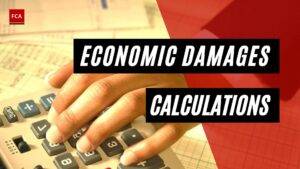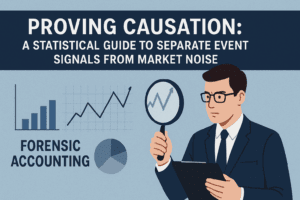Common Mistakes Businesses Make Without Consulting an Economic Damages Expert
Imagine a company facing a contract breach, operational disruption, or an unexpected shutdown. The financial hit is immediate and visible: invoices are unpaid, sales are lost, and profit projections collapse. It’s natural to assume that calculating the loss is straightforward. But in litigation, it rarely is.
Without a qualified economic damages expert, even genuine claims can crumble when examined by opposing counsel or the court. Calculating economic loss requires more than accounting; it requires the intersection of economics, finance, and law.
At Joey Friedman CPA PA, Mr. Friedman and his team have seen countless businesses underestimate the complexity of proving financial harm. Their experience shows that the right expert doesn’t just calculate numbers. They build a credible financial case that can withstand legal scrutiny.
Why Economic Damages Require Expert Analysis
Economic damages are not simply “money lost.” They represent the measurable difference between what actually happened and what would have occurred if no wrongful act or event had taken place. This distinction is critical.
A professional economic damages expert applies financial modeling, market analysis, and recognized valuation methodologies to calculate those losses accurately. They consider factors such as:
- Causation: Identifying the direct link between the incident and the loss.
- Mitigation: Accounting for steps taken (or not taken) to reduce losses.
- Future earnings: Estimating projected income or growth that was prevented.
- Present value: Discounting future amounts to reflect current worth.
Courts, insurers, and opposing experts examine every assumption closely. Unsupported calculations or vague methods can disqualify entire claims. A seasoned expert ensures the process meets both accounting and legal standards, giving findings the credibility they need in negotiations or testimony.
Mistakes Businesses Make Without Consulting an Economic Damages Expert
Mistake #1: Assuming Accountants or Auditors Can Handle Damage Calculations
One of the most common misconceptions is believing internal accountants or auditors can accurately assess damages. While they understand the books, damage assessment requires a different skill set.
Traditional accounting reports on the past, summarizing income, expenses, and net results. An economic damages expert, however, looks at the “what-if” scenario, estimating what would have happened if the damaging event hadn’t occurred.
For example, in a breach-of-contract case, an accountant might report a loss based on revenue decline, but an expert adjusts for factors like preexisting trends, market downturns, and variable costs. Without these adjustments, losses can be overstated, leading to credibility problems or case dismissal.
A damages expert also applies standards recognized by courts, ensuring that calculations align with accepted economic theories and professional valuation practices.
Mistake #2: Using Simple Math to Estimate Complex Losses
It’s easy to calculate losses using surface-level math: lost revenue multiplied by time. But real-world business operations aren’t linear. This approach ignores cost structures, market volatility, and recovery patterns.
An economic damages expert analyzes profitability, not just revenue. For instance, if a company loses $1 million in sales but saves $400,000 in costs due to reduced activity, the net loss is far smaller. Similarly, if market share would have naturally declined during that period, failing to account for it inflates damages.
Experts also evaluate mitigation, a key legal requirement. Businesses are expected to take reasonable steps to minimize their losses, such as finding alternate suppliers or shifting production. If they don’t, courts may reduce the claim. A professional analysis documents these efforts and adjusts projections accordingly.
In short, complex losses require structured modeling, not assumptions.
Mistake #3: Ignoring the Role of Causation
Causation is the foundation of every damages claim. Failing to establish a direct cause-and-effect link between the event and the loss can invalidate even the most detailed financial analysis.
For example, if a company claims profit loss due to a supplier delay, but data shows declining demand before the incident, only a portion of that loss qualifies as economic damages. The rest may stem from unrelated market factors.
An economic damages expert isolates these variables using comparative data, industry benchmarks, and regression models. They demonstrate that the claimed losses directly resulted from the specific event, not from external or internal issues.
This distinction matters because courts expect claims to be both causally linked and economically sound. A report that fails to prove this connection is easily challenged by opposing experts.
Mistake #4: Overlooking Future Damages or Discounting Them Incorrectly
Another frequent mistake is focusing solely on past losses. Many cases involve long-term harm, such as lost clients, delayed projects, or reputational damage that affects future income. If those aren’t quantified properly, businesses risk significant under-compensation.
On the other hand, projecting future earnings without discounting them to present value leads to inflated claims. Courts expect a realistic assessment that reflects economic principles such as risk, inflation, and opportunity cost.
An economic damages expert determines how long the effects will last, whether the business can recover, and how future profits should be discounted. They use standard financial formulas to bring future cash flows into today’s value, producing results that are mathematically sound and legally acceptable.
A common mistake here is assuming future profits continue at historic rates. Experts instead analyze market data, capacity constraints, and replacement opportunities to create balanced projections that stand up to scrutiny.
Mistake #5: Presenting Unsupported or Non-Replicable Calculations
A damages analysis is only as strong as its documentation. Unsupported spreadsheets, missing assumptions, or inconsistent figures raise immediate red flags in litigation.
Opposing counsel often challenges damages reports by asking: Can another professional replicate this outcome using the same data? If not, the report’s credibility collapses.
An economic damages expert documents every source, from sales records and contracts to market data and cost assumptions. They maintain transparent workpapers, allowing others to verify the results. This transparency not only strengthens the case but also enhances trust during settlement negotiations.
Additionally, experts know how to communicate complex financial concepts clearly. Courts prefer evidence that’s logical and easy to follow. A methodical, well-supported analysis carries far more weight than a high but unexplained number.
Mistake #6: Waiting Too Long to Bring in an Expert
Timing is often the silent mistake. Many companies only seek expert help after litigation begins or once financial records are already incomplete. By then, valuable context or evidence may be missing.
Engaging an economic damages expert early helps preserve relevant data, define loss periods accurately, and identify which documents or metrics are critical to proving the claim. Early involvement also allows alignment with legal counsel, ensuring that financial evidence supports the overall legal argument.
An early-start approach also benefits settlement discussions. When a well-prepared damages report is available early, it provides leverage for fair negotiation, potentially avoiding the cost and stress of trial.
Simply put, the earlier the expert is involved, the stronger the case becomes.
Mistake #7: Poor Coordination Between Legal and Financial Teams
A strong damages case requires seamless communication between attorneys, business leaders, and financial professionals. When these teams work in silos, inconsistencies appear. For example, the legal claim might cover a time frame different from the one analyzed financially.
An economic damages expert bridges this gap. They understand both the financial and legal dimensions of loss. Working with attorneys, they ensure calculations align with the case strategy and legal definitions of damages.
Coordination is also crucial when integrating forensic accounting. Forensic accountants verify and organize financial data, while damages experts interpret it economically. Together, they produce analysis that is both factual and strategic, combining accuracy with persuasion.
Mistake #8: Overlooking the Importance of Independent and Credible Testimony
Even a well-prepared report can fall apart if the person presenting it lacks credibility. Courts and arbitrators weigh not only the numbers but also the professionalism, independence, and confidence of the expert delivering them.
An experienced economic damages expert witness understands how to present findings clearly and withstand cross-examination. They explain the methodology, acknowledge limitations, and defend their conclusions without bias.
Choosing an independent professional rather than someone tied too closely to one party ensures the testimony appears objective. This impartiality often determines how much weight the court gives to the report.
At Joey Friedman CPA PA, reports are designed to meet both technical and evidentiary standards. Each analysis is supported by verifiable data, clear reasoning, and professional objectivity that holds up under scrutiny.
The Value of Working with the Right Expert
All the mistakes above share one common theme: avoidable risk. Businesses that rely on assumptions or unverified internal estimates expose themselves to unnecessary challenges, from reduced settlements to complete claim rejection.
A qualified economic damages expert brings essential value by providing:
- Analytical Depth: Sophisticated modeling and economic reasoning.
- Credibility: Compliance with professional and legal standards.
- Transparency: Clear documentation of every assumption and calculation.
- Objectivity: Neutral, evidence-based analysis trusted by courts and opposing counsel alike.
For companies facing complex disputes, expert involvement is essential. A structured, defensible damages assessment strengthens your case, improves negotiation outcomes, and ensures fairness in recovery.
Conclusion – The Cost of Not Getting It Right
Calculating economic loss isn’t just about numbers. It’s about proving a financial truth. A poorly supported damages claim can weaken a case, delay resolution, or permanently reduce recoverable compensation.
Working with an economic damages expert ensures your financial story is accurate, consistent, and credible. They help transform assumptions into evidence and uncertainty into clarity.
At Joey Friedman CPA PA, the team approaches every case with accuracy, transparency, and integrity, helping clients present their financial claims confidently and effectively.
Looking for an Economic Damages Expert?
If your business is preparing for litigation, negotiation, or settlement, consult a qualified economic damages expert before finalizing your claim.
Joey Friedman CPA PA specializes in detailed economic damages evaluations and expert witness services that stand up under legal and financial review.
Schedule a confidential consultation today to strengthen your case with clarity, accuracy, and expert insight.




